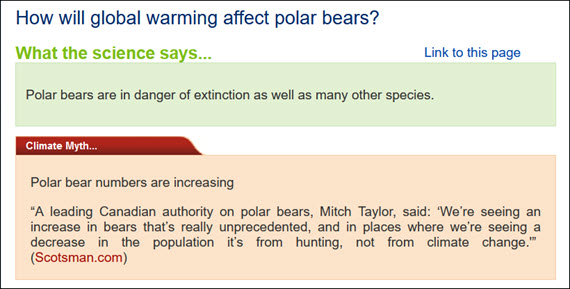At a glance - How will global warming affect polar bears?
Posted on 23 January 2024 by John Mason, BaerbelW
On February 14, 2023 we announced our Rebuttal Update Project. This included an ask for feedback about the added "At a glance" section in the updated basic rebuttal versions. This weekly blog post series highlights this new section of one of the updated basic rebuttal versions and serves as a "bump" for our ask. This week features "How will global warming affect polar bears?". More will follow in the upcoming weeks. Please follow the Further Reading link at the bottom to read the full rebuttal and to join the discussion in the comment thread there.
At a glance
Ursus maritimus. The Latin name for the world's largest bear hints at its high dependence on the seas around the Arctic. Polar bears are an apex predator that depend on seals for their food. Because of that dependence they mostly live and hunt out on the sea-ice. Excellent swimmers, they are equipped with the means to swim in the frigid Arctic waters. Thick body fat and a heavy, water-repellent coat make such a lifestyle feasible.
Polar bears live in 19 distinct groups around the Arctic. We don't have great data on eight of the groups. Arctic fieldwork is fraught with logistical problems, especially out on the sea-ice. Regarding the other groups, as of 2017, five are regarded as stable. Two are increasing whereas four are declining. Therefore, it's a mixed picture.
The reason why the picture is mixed lies in the four distinct eco-regions making up the Arctic. Let's look at these. Firstly there is the Seasonal Ice Ecoregion off Canada. Here, the ice has always melted in the summer. The bears hunt voraciously before that happens and then go through a seasonal fast on land. Unfortunately, because the ice-melt is beginning earlier and ending later, the fast period is getting longer, causing malnutrition and cub mortality. This bear population is the one that is definitely declining.
Stretching from Alaska to Svalbard is the Divergent Ice Ecoregion. Here, the ocean currents constantly move the sea-ice offshore as it forms. In summer, new ice does not form and a wide gap of open water exists between sea-ice and the land. Offshore, the sea ice is over the depths of the Arctic ocean - an area of relatively low food productivity. The seals remain near land, in the more productive shallows. Again, the problem facing the bears is the increased length of the ice-free season, for the same reasons as above. Bears living in this region are particularly vulnerable.
In the Convergent Ice Ecoregion, from the North Barents Sea around to Eastern Greenland, ice collects along the shore. The bears living in this region therefore have constant access to ice over shallow productive seas. Finally, there is the Archipelago Ecoregion, around the islands of the Canadian Arctic. Here too, the polar bears have been able to remain on the ice all year round. Both Ecoregions are therefore a known or potential stronghold for them.
The primary threat to all of these regions is obviously sea-ice loss due to climate change. As the sea-ice retreats, the bears have to spend more time on land. This can bring them into contact with human populations and such encounters tend not to end well.
Polar bears belong on the sea-ice. The long term trend for sea-ice extent is downward. Even if some populations are stable or even increasing, it's an uneven picture due to the differing characteristics of the regions they inhabit. Rapid Arctic climate change - Arctic Amplification as it's known - is real. Concern for this magnificent creature is entirely justified.
Please use this form to provide feedback about this new "At a glance" section. Read a more technical version below or dig deeper via the tabs above!
Click for Further details
In case you'd like to explore more of our recently updated rebuttals, here are the links to all of them:
If you think that projects like these rebuttal updates are a good idea, please visit our support page to contribute!































 Arguments
Arguments































Comments